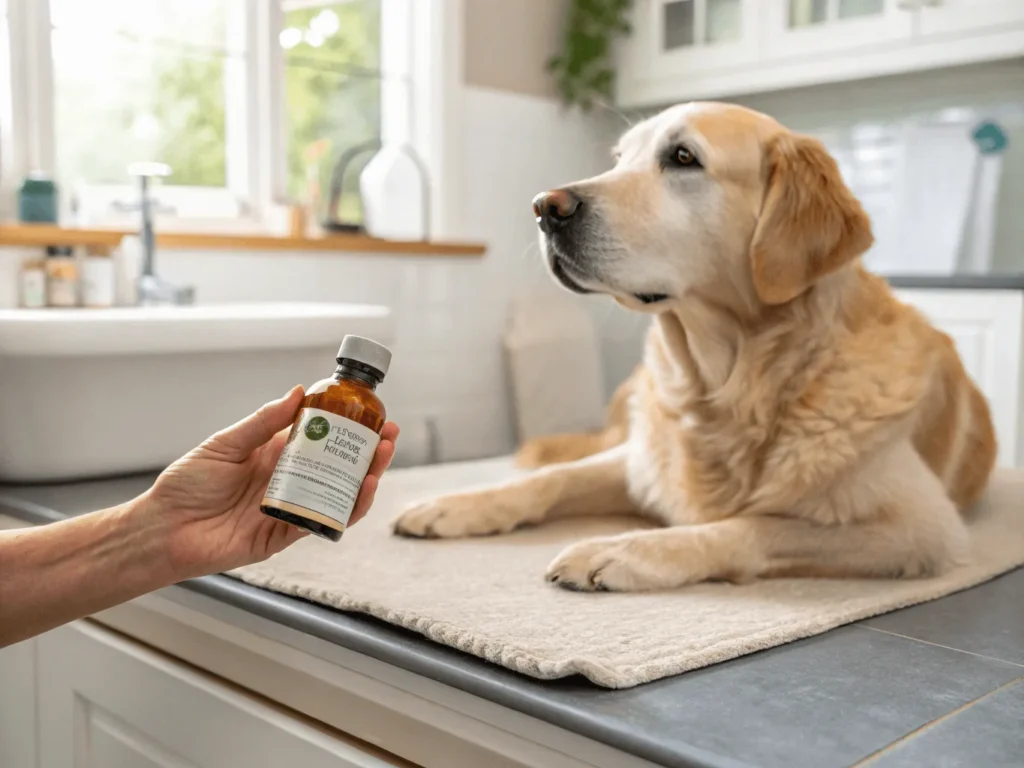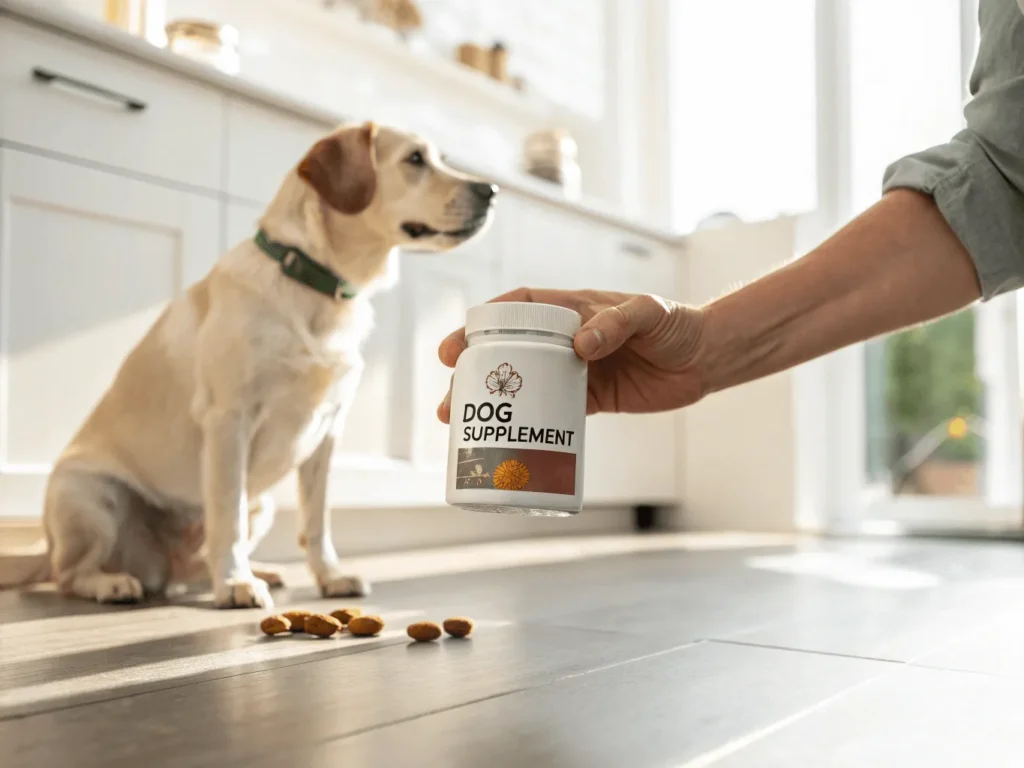Why Dog Supplements Matter More Than Ever
If you’re anything like me, your dog isn’t just a pet — they’re a full-blown family member. You probably already do everything you can to keep them healthy: good food, regular vet visits, daily walks, belly rubs on demand… but even with the best care, many of us find ourselves wondering:
“Is my dog getting everything they need to truly thrive?”
That’s where a dog supplement can make a difference. And no, they’re not just a trendy buzzword. When chosen wisely, a dog supplement can be a game-changer from basic vitamins to targeted formulas that support everything from itchy skin to aging joints. The overview of dog supplements by VCA Animal Hospitals provides helpful insight into how these formulas work. When chosen wisely, they can be a game-changer for your pup’s health and happiness 🐕✨
What Are Dog Supplements, Really?
Think of a dog supplement as a gentle nutritional boost — it’s not a food replacement, but a smart way to support your pup’s overall wellness. they’re not replacements for real food, but powerful little helpers that fill nutritional gaps or offer support where your dog needs it most.
They come in all shapes and sizes:
- Chews
- Powders
- Capsules
- Liquids
- Even treat-style bites (which my dog thinks are snacks 😅)
A dog supplement can provide essential nutrients that might be missing from even the best diets — things like omega-3 fatty acids, probiotics, glucosamine, and more.
Are Supplements Necessary if My Dog Eats a Balanced Diet?
This is one of the most common (and fair!) questions pet parents ask.
Short answer: Maybe.
Longer answer: Even premium dog foods don’t always provide everything — especially if your dog has unique needs due to age, breed, health conditions, or lifestyle.
Here’s what I’ve learned from both vets and personal experience:
Commercial dog food often goes through high-heat processing that can degrade certain nutrients. Plus, not every dog digests or absorbs nutrients the same way.
So while a healthy diet is the foundation, adding the right dog supplement can be the cherry on top supporting specific areas like:
- Joint health in seniors 🦴
- Skin & coat in allergy-prone breeds 🧴
- Digestive balance in sensitive tummies 💩
“Supplements are like a seatbelt — your dog might be fine without them, but they offer extra protection when you need it most.”
Top Benefits of Dog Supplements
Alright, let’s dig into the juicy part. What can the right dog supplement actually do for your furry friend?
Healthier Joints and Mobility in Older Dogs

If you’ve ever watched your dog hesitate before jumping onto the couch or struggle to get up after a nap, you know how heartbreaking joint stiffness can be 💔
A joint-focused dog supplement with glucosamine, chondroitin, and MSM help:
- Lubricate joints
- Reduce inflammation
- Support cartilage repair
Want to go deeper? Check out our full dog joint supplement guide for vet-backed advice and product reviews.
Many pet parents (myself included) have seen noticeable improvement in just a few weeks. Tail wags and zoomies? Yes, please! 🐾
Shinier Coat and Less Shedding

Is your vacuum working overtime? A dog supplement for skin and coat can transform fatty acids (like fish oil) can transform a dull, flaky coat into something silky and shiny ✨
They also help soothe dry, itchy skin — especially in breeds prone to allergies like Bulldogs, Retrievers, and German Shepherds.
💡 Tip: Look for “EPA” and “DHA” on the label — these are the most effective omega-3s for skin and coat health.
Digestive Support for Sensitive Tummies
From gas explosions (you know the kind 😬) to inconsistent poops, digestive issues are all too common. A dog supplement with probiotics can help. PetMD’s guide to probiotics for dogs explains how the right strains improve digestion and gut health.
These friendly bacteria help:
- Balance gut flora
- Improve nutrient absorption
- Reduce diarrhea, constipation, and bloating
They’re especially helpful after antibiotics, food changes, or a stressful event like a move or new pet in the house.
Immune System Boosters for Long-Term Health
Just like us, dogs need a strong immune system to fight off illness. An immune-boosting dog supplement with antioxidants, and certain vitamins can help your pup stay resilient — especially in their senior years or during recovery from illness.
If your dog is prone to frequent infections, slow healing, or chronic allergies, immune-boosting supplements are worth a serious look.
How to Know If Your Dog Needs a Supplement
Here’s the truth: not every dog needs a supplement — but many silently do.
Just like people, dogs don’t always show clear signs when something’s “off.” And since they can’t exactly tell us, we have to tune in closely.
Signs Your Pup Might Be Missing Key Nutrients
Watch for subtle clues like:
- Excessive itching, licking, or shedding
- Dull or flaky coat
- Low energy or stiffness after activity
- Gas, diarrhea, or inconsistent stools
- Bad breath (yes, this can be gut-related!)
- Trouble focusing during training
- Anxiety or restlessness
Of course, these symptoms can also point to other health issues, so don’t jump to conclusions. But if one or more of these sounds familiar, a targeted dog supplement may help ease or prevent these symptoms.
🐾 “I didn’t realize my dog was low on omegas until our vet pointed out her red paws and constant licking. A fish oil supplement made a huge difference within weeks.”
When to Talk to Your Vet About Supplements
Before starting anything new, check in with your vet — especially if your dog:
- Is a puppy or senior
- Has chronic health conditions (like kidney disease or allergies)
- Takes medication
- Is pregnant or nursing
Your vet can help tailor recommendations to your dog’s breed, size, age, and health history. Some nutrients, like calcium or iron, can actually cause harm if overused — so balance is key ⚖️
Types of Dog Supplements (and What They Do)
Let’s break it down into the most common (and helpful!) categories:
Glucosamine & Chondroitin for Joints
This duo is the gold standard for aging dogs or active breeds. It supports:
- Cartilage health
- Joint lubrication
- Reduced inflammation
Best for: older dogs, large breeds, or dogs showing signs of stiffness or arthritis.
🦴 Pro Tip: Pair with MSM (methylsulfonylmethane) for extra anti-inflammatory power.
Probiotics for Gut Health
These are the friendly bacteria that keep your dog’s tummy happy. They help:
- Improve digestion
- Support immune function
- Reduce gas, bloating, and loose stools
Look for strains like Lactobacillus and Bifidobacterium — and make sure your supplement lists the CFUs (colony-forming units) on the label.
Best for: dogs with sensitive stomachs, irregular poops, or recent antibiotic use.
Omega-3s for Skin & Coat
Sourced from fish oil or flaxseed, omega-3s:
- Reduce inflammation
- Improve skin moisture
- Promote a shiny, healthy coat
Bonus: they also benefit heart health and brain function!
Best for: dogs with allergies, itchy skin, or dry coat.
Multivitamins vs. Single Nutrient Supplements
A multivitamin-style dog supplement is a great choice great for overall health but not targeted.
Single-nutrient supplements (like zinc, vitamin E, or biotin) are best when you know your dog needs help in one specific area.
So how do you choose? It depends on your goal:
- Need all-around support? Go multi.
- Solving a specific issue (like hip pain or flaky skin)? Choose a targeted formula.
Natural vs. Synthetic: What’s Safer for Your Pup?
This one sparks a lot of debate, so let’s simplify.
- Natural supplements are made from food-based or plant-based sources. They’re often easier for the body to absorb, but can vary in strength.
- Synthetic supplements are lab-made — not necessarily bad, but the quality really matters here.
The key? Trust the brand and sourcing. Choose companies that:
- Are veterinarian-recommended
- Use third-party testing
- List their ingredients clearly (no mystery blends!)
💬 “Just because something says ‘natural’ doesn’t mean it’s safe. Always read labels and check with your vet if you’re unsure.”
How to Choose the Best Dog Supplement for Your Pet
Choosing the right dog supplement can feel overwhelming. It can feel like walking into a health store blindfolded 😩
Here’s how to cut through the noise:
Reading the Label: Ingredients to Look For (and Avoid)

✅ Look for:
- Transparent ingredient lists (not just “proprietary blend”)
- Clinically studied ingredients (like glucosamine sulfate or fish oil with EPA/DHA)
- Specific dosage amounts
- Natural preservatives like mixed tocopherols (Vitamin E)
🚫 Avoid:
- Artificial colors, flavors, or sweeteners
- Generic “meat flavoring”
- Unclear terms like “natural essence” or “digest”
✍️ Bonus tip: Choose dog supplements made in the USA or countries with strong quality standards.
Vet-Approved vs. Trendy Online Brands
We’ve all seen those Instagram supplements with dreamy packaging. Some are legit — but others rely more on marketing than science.
Stick to:
- Vet-recommended brands (like Nutramax, Vetriscience, or Zesty Paws)
- Products with NASC (National Animal Supplement Council) seal of approval
- Real customer reviews from long-time users (look for stories, not just stars)
Tips for Picky Eaters or Sensitive Stomachs
Some dogs are supplement snobs 😅 Here’s how to win them over:
- Try chewable treats
- Mix powders into food
- Start with half the dose
Right after bath time is a great opportunity, too — especially if you make it part of a fun grooming ritual. Here’s our guide on how to wash your dog properly to keep their skin calm and coat clean before giving supplements.
And always, watch for reactions. Mild gas or changes in stool may happen at first, but if anything feels off, pause and check in with your vet.
Common Mistakes to Avoid with Dog Supplements
Supplements can work wonders — but only when used correctly. Here are a few pitfalls to sidestep:
Over-supplementing (Yes, It’s a Thing!)
More isn’t always better. In fact, too much of certain vitamins (like A, D, or calcium) can cause toxicity or long-term issues.
Especially if your dog’s food is already “complete and balanced,” adding high doses of extra nutrients can throw things off. That’s why vet guidance is golden here 🙌
🧠 “Think of supplements like seasoning. A pinch can enhance the dish, but dumping in the whole jar? Not helpful — and possibly harmful.”
Mixing Human Supplements with Dog Formulas
It’s tempting to share, especially if you’re already taking fish oil or probiotics. But dogs have very different needs and tolerances.
Some human supplements contain xylitol, caffeine, or herbal blends that are toxic to dogs. Others are just dosed way too high.
Stick with pet-formulated products unless your vet gives the green light.
Assuming “Natural” Means Safe
We all want natural options — but “natural” doesn’t automatically mean healthy.
For example, garlic is natural… but toxic to dogs. So are certain essential oils, herbal extracts, and even some mushrooms.
Always read the label. Always double-check the ingredient list. And when in doubt, ask your vet before giving anything new.
Real Stories: What Happened When I Tried Supplements for My Dog
Let me tell you about Luna — my 9-year-old Labrador mix who used to struggle getting up the stairs.
She wasn’t in pain exactly, but I noticed she was moving slower. Less playful. No more tail-wagging leaps when I grabbed her leash 😔
After a vet visit ruled out major issues, I decided to try a joint dog supplement with glucosamine, chondroitin, MSM, and turmeric. I gave it daily, mixed into her dinner.
At first, nothing changed.
But around week three, something shifted.
She started getting up faster. Chasing squirrels again (sorry, squirrels). By week six, she was barking at the door with excitement when it was time to go for a walk.
It wasn’t magic — it was science, patience, and finding the right match for her body. 💕
🐾 “Supplements won’t turn your senior dog into a puppy overnight. But they can make aging easier — for both of you.”
FAQs About Dog Supplements
Can I give my dog supplements every day?
Yes — most dog supplements are designed for daily use to build up benefits over time. Just stick to the recommended dose and be consistent. Think of it like brushing teeth — it works best as a habit, not a quick fix.
Are human supplements safe for dogs?
Generally, no. Human vitamins and formulas are dosed differently and may include ingredients that are toxic to dogs, like xylitol, iron, or caffeine. Always use pet-specific products.
How long until I see results?
It depends on the supplement and your dog’s health.
- For joint support: 4–6 weeks
- For skin and coat: 2–4 weeks
- For digestion: often within days
Give it time and track changes with notes or photos — it really helps!
What age should I start supplements?
It varies:
- Puppies: Usually don’t need extras unless advised by a vet
- Adult dogs (2–7 years): Great time to add targeted support for lifestyle or breed needs
- Seniors (7+): Often benefit from joint, heart, and immune support
When in doubt? Ask your vet based on your dog’s unique situation.
Final Thoughts: A Healthier Dog Starts With the Right Support ❤️
At the end of the day, you know your dog best.
You see the tail wags, the slow mornings, the joyful leaps (or lack thereof). Dog supplements aren’t about chasing perfection — they’re about giving your pup a little extra love where they need it most.
When chosen thoughtfully and used consistently, the right supplement can:
- Ease pain
- Boost energy
- Improve quality of life
That’s not just wellness — that’s well-being 🐾
So trust your instincts. Talk to your vet. Read the labels. And when your pup runs to greet you with brighter eyes, a healthier coat, or a springier step — you’ll know you made the right call 💛

